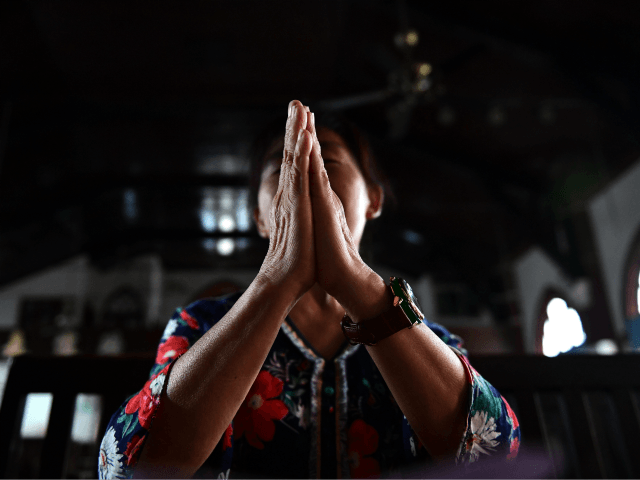The South China Morning Post (SCMP) on Monday reported China’s underground churches used digital resources to commemorate the Easter holiday during a time of coronavirus emergency and heightened government repression.
In fact, the SCMP saluted China’s “house churches” for being ahead of the curve, since they have been using social media and chat platforms to worship since late January, motivated not only by coronavirus quarantines and social distancing requirements but also by the Chinese Communist Party’s (CCP) steadily intensifying war against houses of worship.
The Diplomat noted that even before the Wuhan virus outbreak, Chinese churches were incorporating electronics into their services:
Before COVID-19 hit, phones were already frequently used by mass attendees during the service. Instead of picking up prayer books located in the front of pews, Chinese church goers would look up hymn lyrics on their phones and follow along while scrolling on their screens. When baskets were sent around to collect offerings to the church, you would find a QR code that could be scanned to send money using the Chinese messaging application WeChat, known for its litany of services, including WeChat Pay. Churches also streamed the service for online audiences; however, the live stream was also watched by attendees in the back of the church who were too far away to see the priest.
Church leaders like the SCMP’s pseudonymous Pastor Chen realized it was much easier to restore a banned chat forum than to rebuild churches that get bulldozed shortly after CCP officials suddenly decide their permits are not in order:
Pastor Chen broke the bread and held the wine as he gave his blessings, following the Good Friday Holy Communion tradition that has been celebrated by Christians around the world for centuries – except there was no one to distribute the bread and wine to.
“We are facing a situation that has never been experienced before in the last 2,000 years,” said Chen (not his real name) to his congregation of about 1,000. They were taking part in an online service held over Zoom.
“Today we are separated in different places in our motherland and around the world. Maybe you are at home with your family, or even alone,” Chen said. “But we know that the coronavirus cannot intervene in God’s work in our lives, and our distance does not separate us from coming as one in Christ. We now commemorate Jesus who sacrificed for us.”
He then asked his congregation who were standing in front of web cameras to take the bread and wine, representing Jesus Christ’s body and blood in crucifixion, that was prepared at home by each of the church members.
Several underground pastors told the SCMP they were actually expanding their memberships by offering safe and secure services online, bringing in worshipers who had long been nervous about attending church in person and attracting the attention of China’s repressive government.
House churches have been using their web platforms to raise funds for coronavirus supplies and coordinate volunteer activities, persisting even after local officials ordered them to stop.
“We cannot listen to everything that the government says, or we will get nothing done,” said one undaunted pastor.
Experts in Chinese religious laws noted that unlicensed online worship could be made illegal if regulations proposed in late 2018 are put into effect. This could give the CCP tools to stamp out everything except state-sanctioned churches, and even some of those could see their online outreach trimmed back by the Communists, who are perpetually nervous about any religion growing popular enough to threaten their authority.
Some house churches have contemplated giving their congregations links to worship services streamed by churches outside China if the government decides to crack down on their growing online operations. China’s underground churches often have strong relationships with congregations in other countries, as with the New Life Church in Colorado Springs, which was able to send face masks and other medical supplies to Christian groups in China early in the pandemic, and saw the favor returned when the Wuhan virus began spreading through the United States.
Underground churches may be growing as Chinese citizens seeking spiritual comfort during the pandemic find them online, but the CCP is also using the coronavirus as an excuse to step up its crackdown on churches. In February and March, officials abruptly decided that several duly permitted, state-approved churches had to tear the crosses down from their rooftops because it was illegal for any religious symbol to be raised higher than the Chinese national flag. Some of the crusading Communist officials didn’t even bother measuring the height of the crosses, instead inventing a new standard that religious symbols cannot be too “eye-catching.”
There is little hope for religious believers to make their way into government and change the oppressive system from within. As The Diplomat pointed out, most Chinese public offices require applicants to formally join the Communist Party, and the Party requires a pledge of atheism from its members – a little procedural trap that keeps believers from developing significant influence upon the government, while also allowing the government to pretend it does not explicitly discriminate against religious believers.

COMMENTS
Please let us know if you're having issues with commenting.